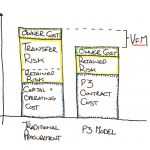The shift in Canadian policy toward sustainable development has been primarily an attempt by core interest groups to maintain control over the environmental agenda. A true shift in priorities and goals will require a transformation of “underlying values and attitudes” (Robinson, 2004).
In Canada, the government acts as a landlord over natural resources which preserves a policy framework that maintains “ongoing federal presence in the regulation of resource activities” (Hessing et al., 2005). Industry is also firmly embedded in the policy system and in some arenas, even seems to dominate the dialogue. This core interest involvement of primarily regulators and regulates, has led to a strategy based on incremental adjustment rather than encouraging a comprehensive paradigm shift in the policy process, and has worked to minimize the participation of other interest groups and the public as a whole.
This predisposition to preserve a traditional policy framework that maintains core interests, works to exclude public participation. This is most evident during the agenda-setting, and the decision-making stages of the policy cycle.
The most widely used model for agenda-setting by the Canadian government is that of inside initiation, wherein “influential groups with special access to decision makers initiate a policy and do not necessarily want it to be expanded and contested in the public” (Hessing et al., 2005). Because agenda-setting is the first phase of the policy cycle, it sets the stage for the steps that follow. By excluding the public from the beginning, the core interests maintain an advantage over the interests of the public.
Further, the complex structure of the decision-making process tends to maintain the exclusion of interest groups and the public. “These factors conspire against the development of new policies that differ substantially from the status quo” (Hessing et al., 2005), and also lead to the development of incremental adjustments. A true shift in priorities and goals will require a transformation of “underlying values and attitudes” (Robinson, 2004).
References:
Hessing, M., Howlett, M., & Summerville, T. (2005). Canadian natural resource and environmental policy: Political economy and public policy. UBC Press, Vancouver, BC, Canada. Print.
Robinson, J. (2004). Squaring the circle? Some thoughts on the idea of sustainable development. Ecological Economics 48: 369-384.





